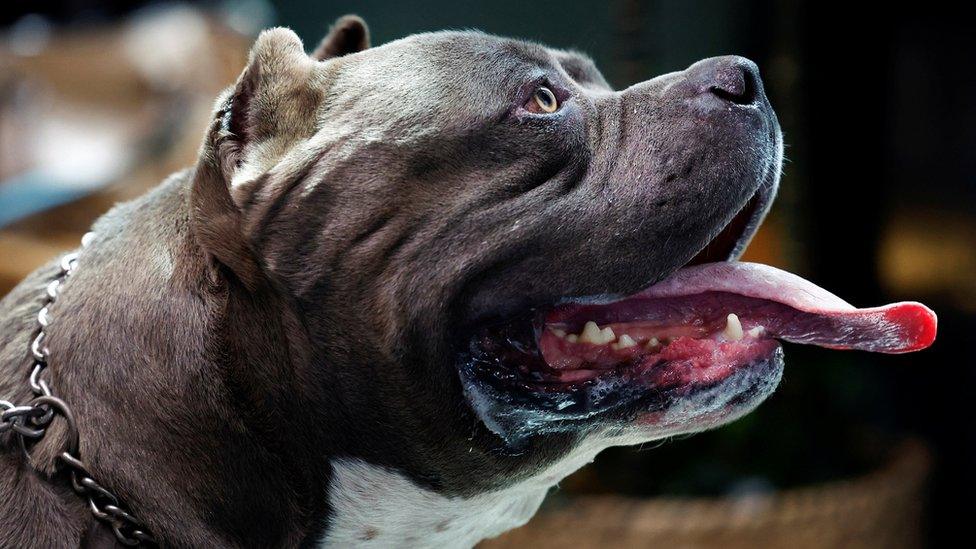American bully XLs: Owners confused by ban, says RSPCA
- Published

Sophie Russell recently adopted American bulldog Autumn, and says she is now torn between muzzling her for life or risking her being seized
The RSPCA has called for clarification over the American bully XL definition, saying owners do not know if their dogs will be classed as the banned breed.
The definition says if a dog meets a minimum height and has a "substantial number" of defined characteristics, it can be considered a bully XL.
But the RSPCA says it is not clear what is meant by "substantial".
The government said an online picture guide would help define dogs included under the ban, coming in this month.
One owner said the vagueness of the definitions meant her dog - which was not bred as a bully XL - was "not going to have a life after December".
In October, the government banned the crossbreed under the Dangerous Dogs Act 1991 following a rise in fatal attacks.
Owners must decide for themselves if their dog is a bully XL by checking it against the government's official definition of the breed type, external.
The RSPCA said it had had an unprecedented 50,000 unique visitors to its online bully XL advice since early September.

American bullies have been involved in several high-profile attacks
"We believe this indicates the deep concern and desire for clarity from pet owners over the recently-announced XL bully legislation," the charity said.
"While we are doing all we can to reassure owners, there remains confusion around how best to interpret the UK government's definition of an XL bully."
The government says if a male dog is at least 20in (51cm) at the tallest point between the shoulder blades, or 19in (48cm) for a female, and has a substantial number of the defined characteristics, it could be considered a bully XL.
The Department for Environment, Food and Rural Affairs (Defra) recommends "taking a precautionary approach", and if owners are not sure if they have a bully XL, they should "comply with all new requirements for this dog type".
The guidance also says pedigree breeds, including those recognised by the Kennel Club, external that may meet some of the characteristics of the bully XL, are not included under the ban.
This has left owners, particularly those with crossbreeds that meet many of the characteristics, confused about whether their dogs fall under the ban, the RSPCA said.
It said that while it was now clearer that the minimum height was a mandatory part of the definition, there was no guidance to help owners "understand what is meant by a substantial number of the other characteristics" used to decide whether a dog was a bully XL.

Robyne Reid says she's taken her dog Vinnie to local dog shows, and that at the last one he won "best in show"
Robyne Reid, of Cannock, Staffordshire, said she believed her dog Vinnie met the characteristics of an XL bully, despite not being bred as one.
"His dad is a Neapolitan Mastiff-Great Dane cross, and his mum is an American bulldog... He's got more of [the characteristics] than not," she says.
She said two-year-old Vinnie had not shown any signs of aggression and had been trusted near her grandson since birth.
"I feel like Vinnie's been penalised because of the way he looks, not because of his breed," she says.
"I'm so mad at this ban. I understand what's going on, and they do need to look at the owners because they are the biggest issue."

Robyne says Vinnie has never been aggressive and has always been trusted near her grandson
From 31 December it will be against the law to sell, abandon, give away, breed, or have a bully XL in public without a lead and muzzle.
From 1 February 2024, owning a bully XL in England and Wales without an exemption certificate will be a criminal offence, external, resulting in an unlimited fine and seizure of the dog.
Robyne said she was lucky to rent 40 acres at a nearby stables where Vinnie could continue running without a muzzle after he is exempted, but that "a lot of owners haven't got that".
"We'll do whatever we need to do to keep Vinnie and for him to have a life," she says.
"But he's not going to have a life - he's got no life after December."

Sophie Russell says her bulldog meets about half of the defined XL characteristics, but doesn't have a "stocky muzzle" and weighs less than her Labrador did
Sophie Russell, who lives in Kent, adopted 18-month-old Autumn from Battersea Dogs and Cats Home in September and said her pet's paperwork stated she was an American bulldog.
Sophie said it was not clear if Autumn, who she said only has one eye and has never shown any aggression, fell under the XL bully definition. However, she felt she would have to register her dog for exemption.
"She does come over the 19in and she probably has some of those characteristics, but it's so vague and so open to interpretation," she says.
"Why is there not someone that I can take her to? Why are there not people trained already that I can take her to and and say, 'is she, or isn't she?'."
Sophie said she felt "torn" about committing to muzzling Autumn for life under the terms of the exemption, or risk her being seized.

Autumn has always been "really sweet" with other dogs and people who have seen her when she's out walking, Sophie says
"I didn't really consider that she would come under this ban because when they were talking about XL bullies at the time, they were talking about these big nine-stone dogs," she says.
"She's four-and-a-half stone. She weighs less than my Labrador used to weigh."
A study published in the Public Health journal showed there was a sudden spike in deaths from dog attacks in England and Wales in 2022 - 10, compared to an average of three in previous years.
A man died after a suspected attack by an American bully XL in Walsall on 14 September. Days earlier, an 11-year-old girl, along with two men, were attacked by an American bully XL in Bordesley Green, Birmingham.
Another man died after being attacked by a suspected bully XL in October near Houghton-le-Spring, a day after a toddler was taken to hospital in London after being bitten by a dog thought to be the same breed.
'Precautionary approach'
Defra said the government had consulted police forces, local and national authorities and animal welfare and veterinary experts to define the characteristics of bully XLs.
A spokesperson said the department had published guidance and a picture bank to help owners to determine whether their dogs fell under the ban.
"If owners are unsure whether their dog is an XL bully, they should take a precautionary approach and comply with the relevant requirements and restrictions as they come into force," they said.
"If someone has a dog that is clearly another established breed, such as a Rottweiler, the XL bully ban does not apply."
Related topics
- Published26 November 2023

- Published23 November 2023

- Published4 November 2023

- Published24 March
